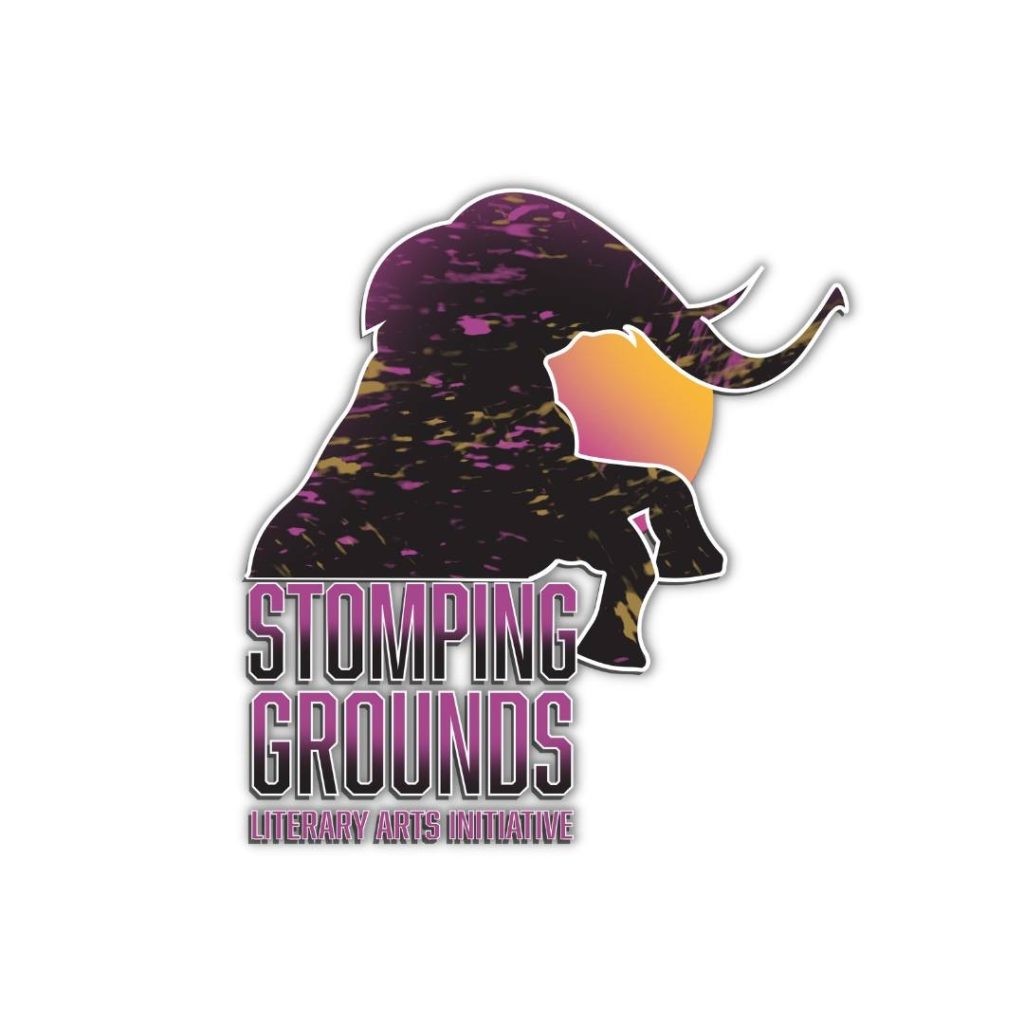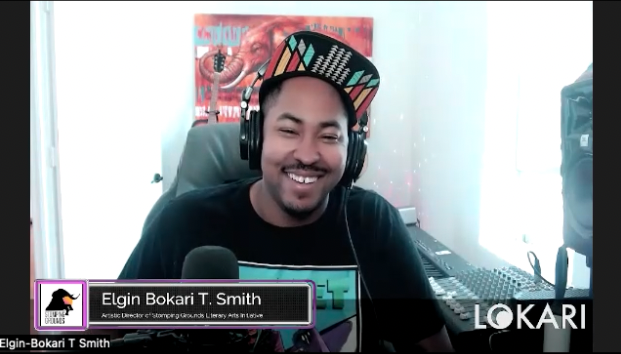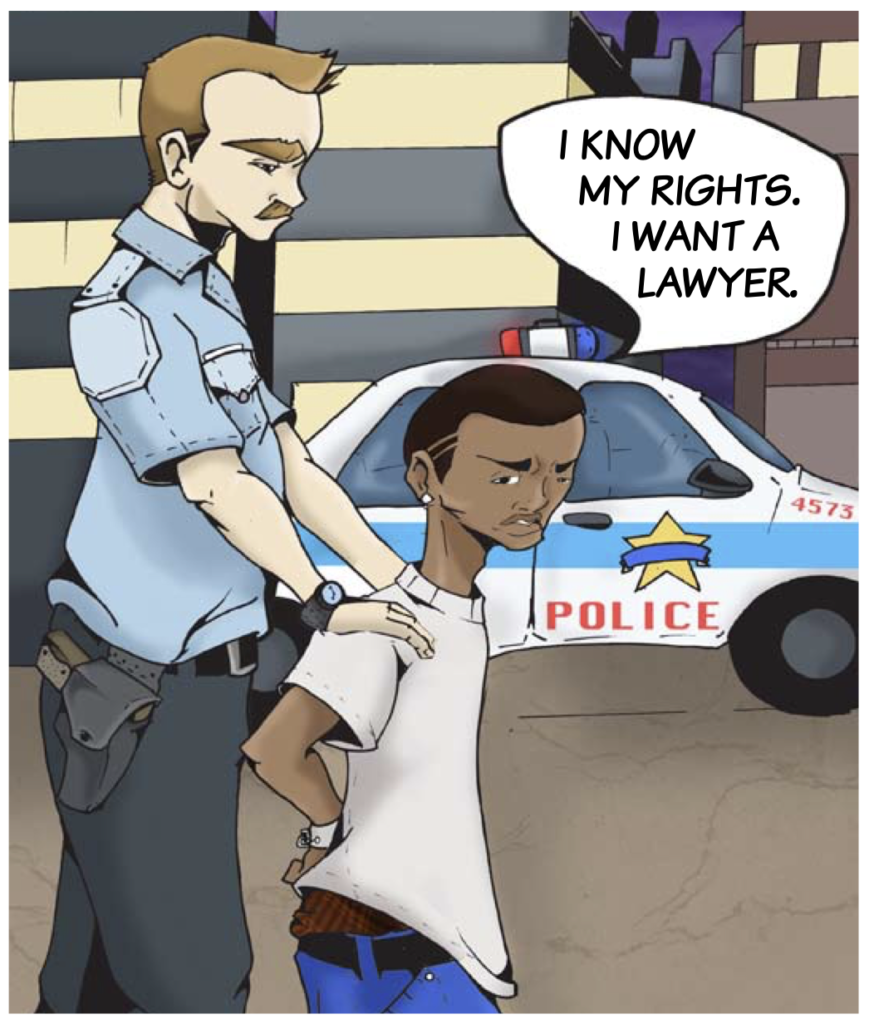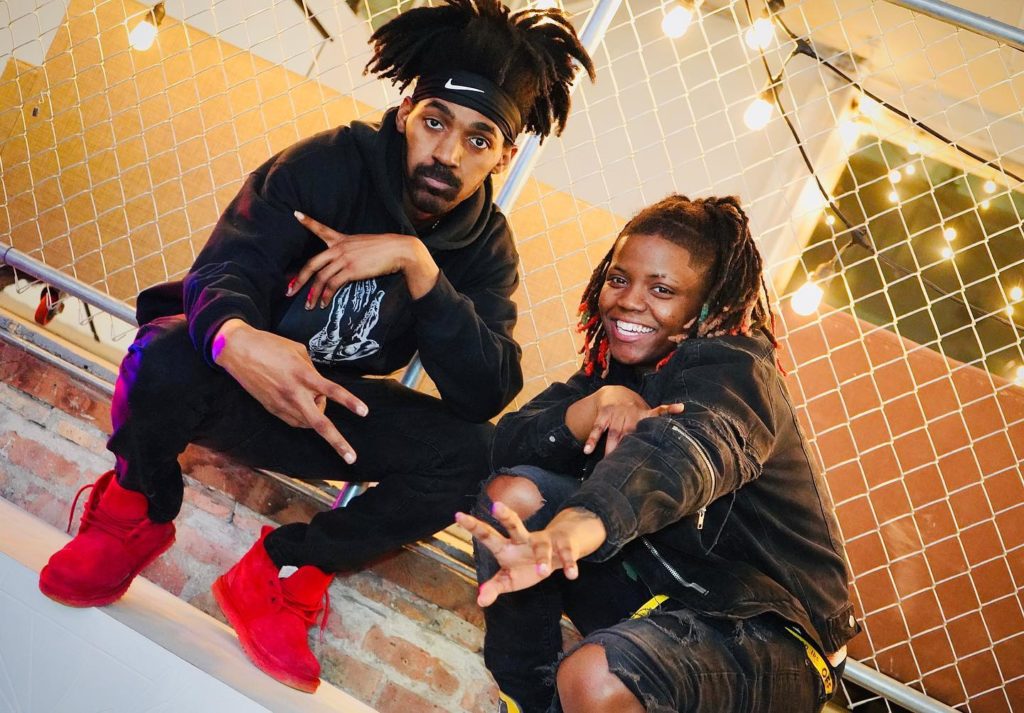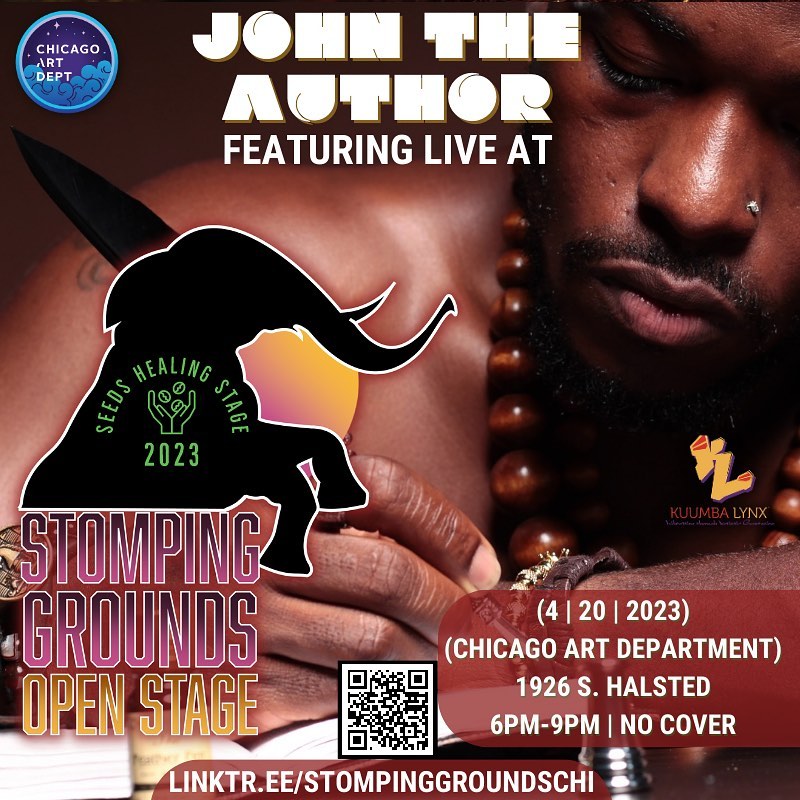Sabrina Boggs, from the RDLF, recently interviewed Elgin-Bokari Smith about the long history and recent rebirth of Stomping Grounds Literary Arts Initiative (SGLAI). In addition to being the organization’s Artistic & Executive Director, he is also the Co-Creator of Pocket Con, the President of Elephant Rebellion, and a 2018 3Arts Awardee.
Tell us a bit about your background.
First off, my full name is Elgin Bokari. I’m originally from St. Louis, Missouri. I went to a performing arts high school, and then left from St. Louis to go to Chicago to attend the School of the Art Institute of Chicago. I graduated in… 2009? It’s been so long. My focus was graphic illustration. And I also took a side focus in ceramics, because I really love ceramics classes.
The [interest in] music production came from my entire life, to be honest. I grew up in a Baptist church, so singing was always a part of my life. My grandma was an amazing singer. She’s since passed on. She lived to be 101, which is pretty phenomenal. In church I was in a gospel choir group, part of the men’s chorus. Today, I am a member the men’s chorus at Trinity United Church of Christ.
Also, I took a minor in piano while I was at Central Vision Performing Arts High School. My piano teacher in high school really changed my trajectory. He is a really famous musician in St. Louis by the name of Ptah Williams, and he’s the master of piano improvisation. When he realized I could play music by ear, he said, “Man, you have a special gift. Let’s train your ear.” And that’s how I started making my own music. So from gospel, to learning classical piano, and just growing up in 90’s hip hop — that was my intro into music.
I attribute a lot of my later journey in life to two people, one of them being a soul singer from the 70’s by the name of Morris Jefferson. He was also a member of the men’s chorus, and he and I were working on a gospel album together. He had passed on, unfortunately, before we were able to finish the project. And then the other was from a group of activist-artists by the name of Elephant Rebellion. A young man by the name of John Vietnam was getting that group started when he was going to school in Madison. [After his passing], those young men and women decided to keep the group going and they recruited me. I learned more about hip hop production and stuff like that through them.
The logo for Stomping Grounds is an elephant. Does Elephant Rebellion come into play with that?
It 100% does. Matter of fact, the Stomping Grounds Open Mic started out of Elephant Rebellion. We originally created an open mic called Youth Empowerment Open Mic for the youth that we were organizing at Kuumba Lynx (KL). One of those youth ended up becoming a member of Elephant Rebellion. His name is Angel Pantoja — extremely talented young man. But we can’t bring all the kids to become a member of Elephant Rebellion, so we were like, why don’t we make an official open mic for Free Write Arts & Literacy [called Stomping Grounds], where we bring the young people from KL to help host and put on the event, and we invite our young folks who we’ve worked with inside the juvenile?

It’s a space where they can showcase the skills that they had learned while they were incarcerated, and also be received by a group of kids who have already dealt with the law. And putting it at Chicago Art Department (CAD) in Pilsen was our idea, because that’s a centralized location for everybody to be able to meet. And a lot of the young people’s ops wouldn’t necessarily be going to an art gallery.
The idea of “Stomping Grounds” was, it’s the place where you go and get your feet wet, and get better at your craft. “Let’s all go to our stomping grounds.” Elephants stomp and move together. We wanted to continue that on [after Free Write dissolved], so once we got presented with the idea of continuing under a new entity, it was like, what is a name that the young people would know? That’s how Stomping Grounds Open Stage continued on from there.
How has your history with FreeWrite affected you and SGLAI?
I came into this justice work, specifically working with youth who are incarcerated, because of my work that I did with Free Write. It most definitely changed my life. My first day that I went to teach for Free Write, I was a little afraid. As a fresh 22 year old straight outta college, I was like, these young people aren’t gonna wanna learn from me. So I think I’ll bring some art with me. And maybe when they see my artwork they’ll want to learn from me then. When I was in the line scan, I ran into Jean Meister, who was working on the Know Your Rights booklet. And she was like, “Oh, these are really cool drawings! Here’s my email, do you have a card?” And that ended up being the beginning of “Your Guide to the Juvenile Justice System.”
That same summer, I got hooked up with the Hull-House Museum because they were working on a comic zine series called Unfinished Business. And they had recruited me to make a comic book about my experience as a teacher inside the juvenile system. So that entire summer I taught a class for Unfinished Business, teaching young people about comics. And I ended up making a comic book expressing how that summer went. It’s called Youth Stories. It was used to teach instructors things they should know if they teach in an incarcerated space. So two of my publications came from [connections made in] my first year teaching at Free Write.
Because of Know Your Rights, I got a chance to go back to St. Louis when the uprisings were happening with Mike Brown. I was able to take that comic and go speak to lawyers in St. Louis about what they should do and how this material can be transferred over. That’s also how I was able to meet Kristiana and Damon from Let Us Breathe Collective, and talk to the Lost Voices and the rest of the organizers of St. Louis who were holding it down. I was able to share the comic book with them, as well as help them peacefully protest. All this came from that one day of showing up with some sketches to go teach.
At Free Write, I was teaching in the jail, and in the community at the Gary Comer Youth Center (GCYC). And that’s when I came up with the idea of Pocket Con, because there wasn’t enough artists of color that looked like me working with kids on the South Side. Kids can’t see comic book characters who look like them if there aren’t any artists that look like them doing it. I’m a Black illustrator so obviously we exist, and I wanted them to know more about that. We did the first three conventions at GCYC.
A lot of that work was us flying by the seat of our pants. At the end of the day, I don’t think that I would have been a program director if Free Write didn’t give me the opportunity to grow and the space to be creative. Despite the way that they ended, they helped to inspire a lot of people. It’s a lot to live up to.
So far, what is your biggest achievement, and your biggest obstacle?
Man, biggest achievement… I don’t really think about myself like that, so it’s kind of a weird thing to think about. Having the courage to continue this organization under my own entity, it’s been a huge accomplishment. I’m tired. I’m really tired. But the fact that we’re able to do this work now in facilities is really amazing. Also, this might sound kind of weird, but between about 2021 to when we started in April [2022], being able to say that I was able to support myself financially through my own music production and creation during that time, while also getting [SGLAI] to the point it’s at right now, is a huge achievement.
When [Free Write] went down, that was probably one of the worst lows of my life. Easily. Imagine everything that you knew, your norm for about the past ten years, is now gone. Not only is it gone but, people say you have to do it on your own now. All those things that you had to help you hide your insecurities, hide what you’re not as good at, you now have to go figure that out. And you gonna be broke for a while. For real. But I’m proud to say I never missed a meal, I never missed a rent payment, nothing. Out of all the awards, songs, gigs, whatever…. Saying that I was able to survive and not worry too much about stuff… That was huge. And I was really proud that Richard Logan believed enough in the work to want to see it continue.
As far as the biggest obstacle… Time. Time management, finding breaks, and I think just taking a chance to just learn a lot of new things. I also think one of the biggest obstacles is the spirit of comparison. Social media is dangerous sometimes. Comparing yourself can ultimately destroy you. It’s like how you just asked, “What’s your biggest accomplishment?” And I’m like, “Uhhhh, well, here’s all the things I haven’t done! Here’s all the things I gotta do!” We live in a society that’s obsessed with what’s next. “Have you seen this, have you seen what that person’s doing?” Trying not to get boggled up into the spirit of comparison is probably one of my biggest obstacles.
What experience from SGLAI’s short history has really stuck with you?
The online experience throughout the pandemic was pretty cool, mainly because it forced us to grow in a weird way. Also, we were able to bring in some artists that you never get a chance to [work with]. It was cool to be like, “Hey, I’m gonna jump on a Zoom call with Ruby Ibarra,” or “with one of my favorite artists Substantial.” And also to get people to participate from all corners of the world was really fun. Being able to add that hybrid version of it right now, I think this is one of the most creative times we’ve ever had with Stomping Grounds. It’s added another level of safety that people don’t really think about.
One of the things that sticks with me the most is when we were first getting it together. I made sure that I talked to everyone I knew that was doing open mics. I let them know what I wanted to do with Open Stage to make sure I wasn’t stepping on their toes, but also bringing something that their youth would also want to receive. So it was like a “both, and.” One of my favorite open mics during that time was called The Gala, and the host of that open mic was Binkey. I brought him in to teach a hosting class for the music production crew at Kuumba Lynx.
One of the youth that came to that, his name is MceeBaby. He was the host that first day of Stomping Grounds, and he’s still the host today. So he’s been hosting that open mic for damn near six years now.
We know SGLAI is holding programs at CAD again. Have you restarted Open Stage in the prisons as well?
We’ve done one so far, and the young people are ready for a second one. We did our first Stomping Grounds Open Stage in the Illinois Youth Center (IYC), actually within the first 6-7 weeks of starting programs. Mainly because IYC was really excited about us coming back, and they really wanted an open mic. It was cool, for the first one. We most definitely want to do it on a larger scale. People are asking about it, especially in the Juvenile Temporary Detention Center (JTDC).
But the first one at IYC in Chicago went really well. Our featured artist ended up being John the Author, who is a really amazing musician. He came in on two different occasions. The first was him coming in the third week of programs to do the same workshop he would do within the outside version of Stomping Grounds. But this time the young people had time to sit with his workshop, come up with some pieces, and then have a place to perform it in the next four, five weeks when he came back to do a feature. That way the featured artist is able to see the effectiveness of the workshop that they led. But we are planning more inside of the juvenile. I have to keep reminding myself, it’s only been since April, man, calm down. We haven’t been at it this long.
What changes to the youth justice system would you like to see?
I wanna see more youth creative spaces where young people are able to express themselves, and also have tangible resources that they can use. I feel like right now we’re in a really interesting space because the pandemic has changed everything in a sense. From 2016 to 2019 was the peak, that I saw, of real youth justice social interaction. It was bubbling up after Trayvon Martin, but after Mike Brown died, I think that’s when young people were really like, “Alright, we gotta do something.” And that’s where we see [in programs like] Brave New Voices and Louder Than a Bomb, young people actually have places to express themselves, and are getting rewarded for these types of things. It felt like an energy around the city when folks really wanted to get out and organize on a larger scale.
And I feel like it has significantly dropped off since the pandemic. People are really fighting to feel normal again. I don’t know what it felt like for young people to have to have graduated on Zoom, or meet their classmates online. What happens to our human interactions, you know? Our youth have been crying out for quite a while. When people show up downtown and destroy all your shit, it’s for a reason.
We are trying to turn our kids into adults so quickly. I even see it in the content of what young people wanna talk about. I wasn’t thinking about talking about none of what the kids talk about nowadays. Lean, getting high, sex — I wasn’t thinking about that as a kid, like not really! So I really wanna see us get back to a place where not only do youth feel understood, but feel comfortable being vulnerable, and being just kids. We have to grow our kids up so fast because we’re afraid. But they don’t have a childhood no more. We put so much pressure on kids nowadays to figure it out and be ready, but I think a lot of us are still figuring it out too. You shouldn’t have to do that at 10 years old. You shouldn’t be trying to fight for your life and fend for your family at such an early age. So when we talk about youth justice and juvenile justice, I really want a place where people feel cool just being kids again.
One last question: What do you want the world to know about SGLAI?
That we are small but mighty. That we’re learning. Just like in the title, Stomping Grounds, this is where we figure it all out. That we are very passionate about wanting to do things right, to move with intention. And even when we don’t get everything right, we’re working on it. We are continuing work from an organization that’s been around for over 20 years now, but this is a brand new organization, and I’m treating it as such. It’s about what we’re doing now. It’s about the work that young people are gonna make from this point forward. From April 2022, that’s the work that you are hopefully buying into. We’re getting our feet wet and we are growing every day, just a little bit more. And I can’t wait for the team to expand. And we gotta expand with intention, that’s all.
